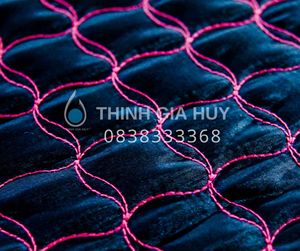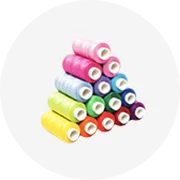

Wholesale textile inventory polyester knitted ice flower design style Korean velvet inventory sofa fabric















In the bustling world of textile commerce, fabric wholesale in Canada stands as a cornerstone for businesses looking to source quality materials for their diverse product lines. From the high-fashion runways to the cozy corners of home decor, the demand for a variety of fabrics is ever-present. Alibaba.com emerges as a central hub for this vibrant trade, offering an expansive selection that promises to meet the nuanced needs of businesses across the nation. This article delves into the multifaceted role of Alibaba.com in the Canadian fabric wholesale market, exploring the vast array of materials available, their applications, and the key considerations for businesses when selecting fabrics. Join us as we unravel the threads of this industry, ensuring your business is well-equipped to weave success in the competitive fabric market.

Alibaba.com stands as a pivotal player in the global fabric wholesale market, offering a diverse range of fabric options for various business needs. It serves as a bridge connecting suppliers and buyers, facilitating the procurement of textiles for a multitude of applications. The platform's extensive collection includes fabrics suitable for fashion, upholstery, outdoor apparel, and household items, catering to a broad spectrum of industry requirements.
Businesses can explore an array of textiles, from durable synthetics to luxurious weaves, ensuring they find the perfect match for their product lines. Alibaba.com's offerings extend to specialized fabrics, such as waterproof materials for outdoor gear and microfiber textiles for cleaning applications. The platform also emphasizes sustainability with options like recycled polyester, aligning with the growing demand for eco-friendly materials.
The versatility of the fabrics available is matched by the convenience of the platform, streamlining the sourcing process for businesses across Canada. With a user-friendly interface and a vast selection, Alibaba.com simplifies the task of finding textiles that meet specific design and functional criteria, making it an indispensable resource for companies looking to enhance their product offerings with quality fabrics.

The Canadian fabric market has experienced fluctuations over recent years, reflecting a dynamic industry. While there has been a general trend of slight expansion in consumption, the market has not returned to its peak levels of the mid-2010s. Production has similarly seen modest increases, with notable growth in certain years, yet overall maintaining lower figures compared to its highest recorded levels. The export landscape presents a picture of variability, with some years marking significant growth in both volume and value, and others witnessing considerable declines. Canada's exports have found their way to a diverse range of countries, with the UK, the United States, and Australia being prominent destinations. Import patterns mirror this volatility, with a mix of growth and decline periods, and a diverse supplier base. The import and export prices have also seen their share of rises and falls, suggesting a market that is sensitive to global economic forces and changing industry dynamics.
Alibaba.com showcases a diverse range of fabric options catering to the wholesale market in Canada. The selection includes various materials such as spandex, known for its elasticity, making it ideal for form-fitting garments. Cotton fabrics, favored for their breathability and moisture absorption, are widely available, suitable for a range of clothing and bedding applications. Polyester fabrics are also featured, offering durability and wrinkle resistance, commonly used for home textiles and apparel.
For more specialized applications, Alibaba.com provides fabrics like silk satin, which adds a luxurious sheen and smoothness to dress materials and textiles. Canvas fabrics, known for their sturdiness, are perfect for workwear and durable clothing items. Additionally, the platform offers a variety of printed fabrics, including those with chain patterns, floral designs, and abstract prints, which are sought after for their unique aesthetics in fashion and decor.
Businesses can also find specialized outdoor fabrics, designed to offer protection against the elements while maintaining comfort. For eco-conscious buyers, options like recycled polyester spandex blends are available, aligning with sustainability trends. The range extends to double gauze organic cotton muslin, ideal for baby products, and yarn-dyed cotton flannels, perfect for comfortable, casual shirting.
Wholesale fabric purchasing is integral for businesses requiring large quantities of material, such as those in the apparel production industry. Companies benefit from the ability to order in bulk, ensuring they have the necessary raw materials for their projects. This is particularly crucial for those with tight production deadlines, as wholesalers can provide timely delivery of fabrics in the required lengths and colors, helping to reduce overall turnaround times.
Furthermore, the relationship with wholesalers allows fashion brands to access a diverse range of fabrics, which is essential for those dealing with multiple fabric categories. This variety enables companies to stay current with industry trends without extensive research, as wholesalers regularly update their stock. The breadth of available fabrics also means that companies can offer their customers the latest and most sought-after materials in the market.
In addition, working with wholesalers can offer businesses educational benefits. Fashion professionals can gain industry knowledge from seasoned wholesalers, understanding the nuances of fabric types and categories. This expertise can be invaluable in enhancing client relations and solving problems efficiently, ultimately contributing to a company's reputation for reliability and quality in the supply chain.
When selecting quality wholesale fabrics, the 4-point system is a crucial quality control tool used in the textile industry. This standardized method assesses fabric quality by assigning demerit points to defects, offering a clear metric for evaluating textiles. Defects are categorized by their severity, with issues like holes, dropped stitches, and torn selvage receiving up to 4 points. The total points per 100 square yards determine the fabric's quality, with specific thresholds set for different types of fabrics, such as woven versus knit, or silk versus synthetic materials.
Businesses should understand that the acceptable level of penalty points varies depending on the fabric's characteristics, including construction, type, yarn size, and weight. It's important to note that most mills and brands have their own standards for what is considered acceptable, which can differ from general industry standards. Inspectors are trained to identify various types of defects, which are then detailed in an inspection report, contributing to the grading of the fabric roll or shipment.
For businesses looking to source wholesale fabrics, recognizing the importance of such quality inspection systems is key. They ensure that the materials meet the required standards and specifications, which is essential for maintaining product quality and customer satisfaction. By prioritizing fabrics that adhere to these inspection criteria, businesses can assure the durability and appearance of their textile products.

When selecting fabrics for import into Canada, it's crucial to consider the material's compliance with local safety regulations. This includes understanding the regulations surrounding restricted chemicals and ensuring that the fabric does not contain any banned substances as per national environmental protection laws.
Textile labeling is also a significant consideration under national textile laws. Labels must accurately represent the fiber content and dealer identity, and for certain products, bilingual labeling is required. The fiber content should be disclosed in percentages by mass, and any trimming or ornamentation must be accounted for if it exceeds a certain percentage of the product's total surface area.
Furthermore, the flammability of fabrics is regulated, particularly for children's sleepwear, which must meet specific flame-resistant requirements. Compliance with these regulations can often be verified through lab testing, which, while not always mandatory, is a prudent step to ensure the safety and legality of the fabric being imported and sold in Canada.
Lastly, the dealer's identity must be disclosed, which can be done through a name and full postal address or a unique identifier for dealers in Canada. While the country of origin does not need to be included on the label unless a representation is made, it must be declared upon importation to meet national customs requirements.
Utilizing a platform like Alibaba for sourcing fabrics offers several advantages for businesses. The site's global reach connects buyers with a vast array of fabric suppliers, providing a diverse selection of materials to choose from. This variety ensures that businesses can find the specific types of fabrics they need, whether for fashion, upholstery, or other industrial applications. Moreover, the competitive environment on Alibaba can lead to more favorable pricing, as suppliers are motivated to offer attractive deals to stand out in the marketplace. The convenience of online sourcing through Alibaba also simplifies the procurement process, allowing businesses to place orders in larger quantities efficiently, which is often more cost-effective. Additionally, the platform's structure supports easy comparison of different suppliers, enabling businesses to make informed decisions based on factors such as pricing, material quality, and supplier reliability. By leveraging Alibaba, businesses can streamline their fabric sourcing efforts, potentially reducing the time and resources typically required for this critical aspect of their operations.
Navigating logistics and trade on Alibaba involves understanding the platform's role in facilitating international transactions. Suppliers on Alibaba typically expect a Minimum Order Quantity (MOQ), which may not align with models that require purchasing in smaller quantities. For those looking to purchase in smaller quantities, another Alibaba platform might be a more suitable option.
When engaging with suppliers, it's crucial to verify their legitimacy and export history. This can be done using Alibaba's own tools or similar platforms that provide insights into a supplier's export records to America and other companies they've worked with. Ensuring that the company's name matches across records is also a key step in avoiding fraudulent transactions.
Communication with suppliers is often more effective through platforms that are widely used in China for business dealings. Establishing a direct line of communication can improve response rates and facilitate smoother negotiations.
Lastly, while negotiating with suppliers, it's advisable to focus on building a relationship and establishing clear communication rather than emphasizing MOQs initially. This approach can lead to better cooperation and potentially more favorable terms once a dialogue has been established.
Navigating the fabric wholesale market in Canada is a complex task, with Alibaba standing as a beacon for businesses seeking variety, quality, and value. The platform's extensive range of fabrics, from eco-friendly weaves to luxurious silks, caters to the diverse needs of the fashion and textile industry. Understanding the fluctuations of the Canadian market, the importance of compliance with safety regulations, and the intricacies of international logistics are paramount for businesses aiming to thrive. Alibaba not only simplifies sourcing with its user-friendly interface but also provides a competitive edge through its vast selection and cost-effective solutions. As businesses continue to adapt to the evolving trends and regulations, platforms like Alibaba will remain invaluable allies, offering the resources and connections necessary to maintain a robust and dynamic presence in the world of fabric wholesale.